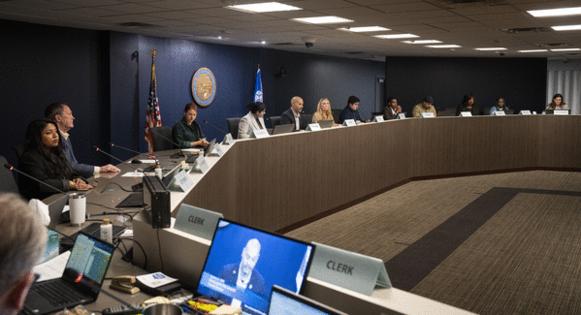Minneapolis City Council votes to study how to tax the rich
Published in News & Features
The Minneapolis City Council is looking into new ways to tax its wealthiest residents and businesses.
On Thursday, the council voted 10-0 to research new sources of revenue, including taxing the city’s upper class in ways that likely would require changes to state or federal laws.
Council members sought to frame the idea as a clapback to President Donald Trump’s “One Big Beautiful Bill” approved by Congress. The signature legislation so far in his current term is anathema to many on the left in that it benefits the wealthiest Americans most through a series of tax benefits, hurts poorer people through cuts in food stamps and Medicaid, and provides a huge increase in funding for immigration enforcement.
Council Member Robin Wonsley said Trump’s “big, horrible bill” was a “handout to some of the most affluent households” in America, at the expense of other public assistance programs.
Council Vice President Aisha Chughtai was confident the move would play well in Minneapolis, an overwhelmingly Democratic city.
“I think that is in line with Minneapolis values,” Chughtai said. “Taxing the rich I don’t think is a controversial opinion in Minneapolis.”
Council Member Aurin Chowdhury called the measure “very forward-thinking” after Congress approved Trump’s “big, disastrous bill.”
“We need wealth distribution in our country and our federal government is simply not going to provide for that,” she said. “We know that poverty is an issue in Minneapolis and it’s time that our City Council speak with deep, deep clarity.”
The measure doesn’t define “wealthy” — it simply directs the city to study new revenue sources. Council members may just qualify: They’re paid nearly $110,000 per year.
Wonsley noted the state Legislature has also explored the idea: One lawmaker proposed a new income tax on the wealthiest Minnesotans to offset federal cuts.
Council President Elliott Payne said finding new sources of revenue is crucial as the council looks for ways to reduce the property tax burden on residents. Property taxes are the largest revenue source for the city’s general fund. The burden has gradually shifted to property owners in recent years, accelerating during the COVID-19 pandemic.
Minneapolis Budget Director Jayne Discenza recently told council members that city expenses are increasing at a faster clip than revenues, and due to increased costs, the property tax levy would have to go up 11.2% to fund current service levels.
The mayor and council have made it clear that’s too big of a tax hike. Next month, Mayor Jacob Frey will release his budget proposal, and the council will make changes to it before final approval in December.
City income tax?
Last fall, Payne and Frey agreed to explore new types of revenue sources at the request of Steve Brandt, president of the Board of Estimate and Taxation (BET). Brandt said he’d support a property tax levy increase this year if city leaders seriously considered more diversified revenue sources.
Brandt has urged the city to consider an income tax for higher earners, a payroll tax, or an increase in the city sales tax. Most of those would require approval from state lawmakers — and couldn’t happen any time soon.
Council Member Katie Cashman said in light of Trump’s “disastrous bill,” it’s important for cities and states to “step up.”
Council Member Jason Chavez agreed, saying, “I believe that we do need to tax the rich. We do need to tax the wealthiest people in the city of Minneapolis if we’re ever going to help address poverty in our city.”
The measure was approved by a vote of 10-0, with three members absent: Andrea Jenkins, Jeremiah Ellison and Emily Koski.
_____
©2025 The Minnesota Star Tribune. Visit at startribune.com. Distributed by Tribune Content Agency, LLC.







Comments